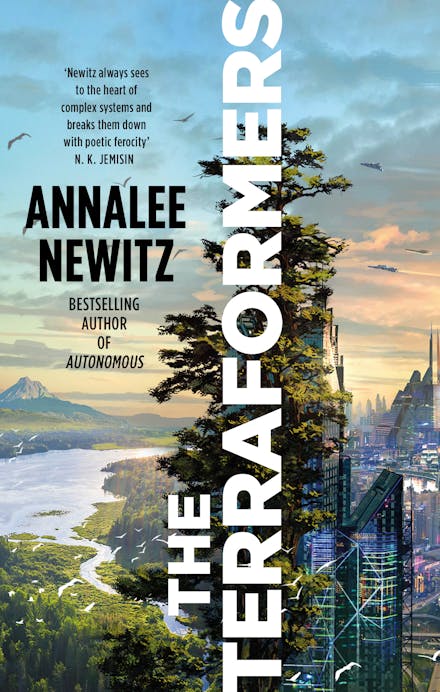
The blurb:
Destry's life is dedicated to terraforming Sask-E. As part of the Environmental Rescue Team, she cares for the planet and its burgeoning eco-systems as her parents and their parents did before her.
But the bright, clean future they're building comes under threat when Destry discovers a city full of people that shouldn't exist, hidden inside a massive volcano.
As she uncovers more about their past, Destry begins to question the mission she's devoted her life to, and must make a choice that will reverberate through Sask-E's future for generations to come.
A science fiction epic for our times and a love letter to our future, The Terraformers will take you on a journey spanning thousands of years and exploring the triumphs, strife, and hope that find us wherever we make our home.
The Terraformers was just a delight to read. I love the scale of it: it starts with Destry, moves thousands of years later to her mentee Misha and Sulfur, one of the citizens of Spider City, then finished up thousands of years later with Sulfur and Misha's child. It's epic, even allowing for the fact that so many centuries into the future, people can live hundreds, even thousands, of years. The span of time allows for vast change in the landscape — both geographic and political — which allows the three parts of the book to tackle different but related issues in its three parts, called Settlers, Public Works and Gentrifiers.
The overarching question I take away from it is about personhood: who is a person? What makes a person? One of the central tenets of the book is the Great Bargain — not dissimilar to David Brin's idea of Uplift, where humanity decides to bestow 'intelligence' on other Terran lifeforms including cats, naked mole rats, and moose, you name it. I've put 'intelligence' in quote marks because it turns out that not all lifeforms are equally treated. Whistle, for example, is Destry's partner - a moose, rated as a Mount as far as intelligence goes. Because he was created as a Mount, he has a limiter in his brain that means he can only talk in one-syllable words (unless they're part of a proper noun). He can think all the complex thoughts he wants, all the long words he wants...but he can only speak in one-syllable words and because he can only speak in words of one syllable, he's deemed to be less intelligent. One of the most heartbreaking moments, for me, was when Whistle was injured and one of his last words before going into surgery was a multisyllabic name — a proper noun, so he could say it. His partner Destry, who is human, misunderstands: she thinks Whistle is talking about myths and stories (the name belongs to a character from a mythologised history of rebellion and uprising). She thinks he likes the story — but he's saying it as rebellion against the limiters that stop him from talking like that all the time.
It's not just animals, either: bots are people, there are hybrids between organic and robotic — and there are different strains of hominins as well. In fact, that's one of the plot points at the start, when Destry and other rangers discover a secretive colony of Archaeans (basically Neatherthal-ish, but modified to live in an Archaean-era atmosphere and begin the process of terraforming the planet. They were supposed to have died out, but there they are. And I mentioned that the third part of the book has Sulfur and Misha's child at its heart...Misha is H. Sapiens, Sulfur is Archaean, so both hominin. You naturally expect Scrubjay to be hominin as well, but...no.
Oh, and everyone — person, Mount, Blessed, everyone — is owned by the corporation and can legally be murdered if they make too much trouble. Only it's not really murder, it's just the company disposing of assets.
So, big question number one in Terraformers: who is a person, what makes a person a person instead of an animal? If a cow can be a person, what about unaltered cows? Are they people, even just in potential?
Question number two: how are we governed, or how do we govern ourselves? The Terraformers is a very sharp critique of capitalism. Vast chunks of the planet are owned by one corporation as theme parks, holiday destinations, for H.Sapiens. The corporation has pretty firm ideas on who those cities are for — it's not for the people who are non H.Sapiens (though they are perfectly welcome to serve H.Sapiens of course).
Good luck finding a home to rent, though.
Number three theme is less a question than a celebration of the effectiveness of self-created family and collective action, and it's those aspect that really bring the optimism and warmth to The Terraformers. There is conflict — but ultimately it is collective action and thinking long-term and widely that save the day.
So. Epic scale, consideration of some massive questions...but still Newitz has written a novel full of warmth and love and optimism. I've had this one in Mount To-Be-Read since it came out; I wish I'd gotten to it sooner.
Started: 22 January 2025
Finished: 28 January 2025
Back home.
More books.